Share

Demand Utopia: A Solarpunk Podcast
The Soft Glow of the Deep Sea: Talking Bioluminescence with Dr. Steve Haddock
You don't have to be a solarpunk—or a lunarpunk—to dream of bioluminescence, from twinkling phytoplankton to glowing lamps, phosphorescent fungi, and jellyfish lit up like space ships. To honor those dreams, we talked to Dr. Steve Haddock, Senior Scientist at the Monterey Bay Aquarium Research Institute (MBARI) and leading expert on the things that glow, flash, and train headlights through the dark waters of the deep sea. Join us for this conversation about how bioluminescence works, what critters are capable of it and what they use it for, and whether or not our visions of bioluminescent street lamps stand a chance of coming true.
You can also follow Steve Haddock on Twitter @beroe and learn more about bioluminescence at https://biolum.eemb.ucsb.edu/.
Connect with Solarpunk Magazine at solarpunkmagazine.com and on Twitter @solarpunklitmag
Connect with Solarpunk Presents Podcast on Twitter @SolarpunkP or Mastodon @solarpunkpresents@climatejustice.rocks
Connect with Ariel at her blog, on Twitter at @arielletje, and on Mastodon @arielkroon@wandering.shop
Connect with Christina at her blog, on Twitter @xtinadlr, and on Mastodon @xtinadlr@wandering.shop
More episodes
View all episodes
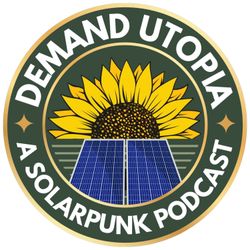
8. No Borders, No Barriers
30:00||Season 5, Ep. 8On this episode of Demand Utopia, host Justine Norton-Kertson talks about the history and purpose of borders, then does a thought experiment imagining what a solarpunk future without borders—with freedom of movement—might look like.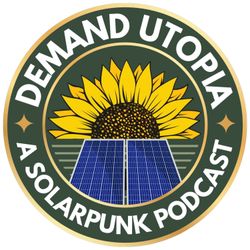
7. SO[L.A.]RPUNK
11:18||Season 5, Ep. 7On this episode, our host Justine Norton-Kertson imagines what Los Angeles might look in a more hopeful, solarpunk future.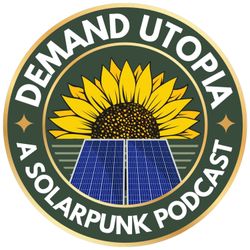
6. DEI, Education, and a Solarpunk Future
29:28||Season 5, Ep. 6In this episode we examine the current attempts to dismantle the U.S. Department of Education and how DEI is at the center of those attacks. Then, we imagine what decentralizing education might look like from a solarpunk perspective instead.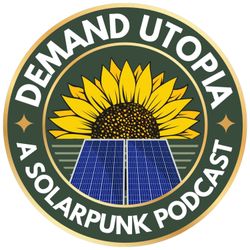
5. Aging with Dignity in a Solarpunk Future
46:18||Season 5, Ep. 5In this episode we introduce our new climate news segment. Then we examine the U.S. social security system, how it's funded and distributed, as well as the current attacks and drive to privatize this century old system of public, collective care. Then we pivot and imagine what elder care and aging with dignity might look like in a more compassionate and decentralized solarpunk future.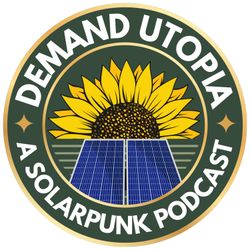
4. Resisting Dystopia is Demanding Utopia
43:07||Season 5, Ep. 4A war on protest has been declared, with promises to expel, arrest, imprison, and deport student protesters. But resisting dictatorship and dystopia is key to building utopia. That's why on this episode, we're breaking down the current war on protest, its connection to past state crackdowns on movements, and how solarpunk offers a different vision. We also talk about various ways people can engage in resistance even if they can't or don't want to attend street protests.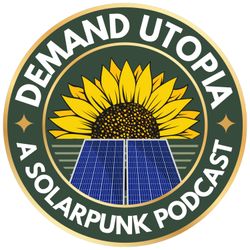
3. Solarpunk vs Imperialism (Pt. 2)
33:13||Season 5, Ep. 3In part 2 of our episode on the rise of a new, more overt brand of imperialism in the U.S. under the second Trump administration, we dive into alternatives to imperialism through solarpunk values and practices.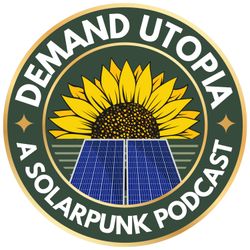
2. Solarpunk vs Imperialism (Pt. 1)
44:23||Season 5, Ep. 2This week, in the first of a two part episode of Demand Utopia: A Solarpunk Podcast, we look at the brazen imperialist moves Trump has made so far in his first month back in the White House, and we discuss his actions within the historical context of U.S. imperialism specifically, and western imperialism in general. Next week in part 2, we'll dive into the solarpunk response to imperialism and look at real life examples of the struggle to end the empire's global exploitation.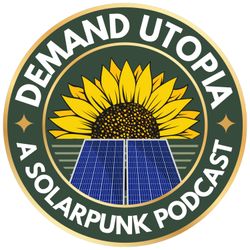
1. Moving Forward
33:46||Season 5, Ep. 1On our first episode back after a nine month hiatus, host Justine Norton-Kertson reflects on the current political landscape, imagines a solarpunk future, and looks at some recent grassroots victories to inspire us for the struggle ahead.
2. The Anatomy of Utopia
55:06||Season 4, Ep. 2In this second episode of Solarpunk Magazine's newly relaunched podcast, Solarpunk Futures: Demand Utopia!, host Justine Norton-Kertson looks at different characteristics, ideas, and alternative systems that have been proposed as part of various utopian visions. And we'll think about how we can apply these lessons to the collective solarpunk world-building project Solarpunk Magazine is launching on May 1st. You can make sure you get notifications when we release new world-building polls and questions buy signing up for our blog or the free section of our Patreon.Join the conversation on social media pages around the questions of community parenting and what ideas you think might best lead to more utopian societies in the future.Instagram | Facebook | Bluesky | TwitterThe Solarpunk Futures: Demand Utopia! podcast is a production of Solarpunk Magazine and Android Press.Produced and hosted by Justine Norton-Kertson.